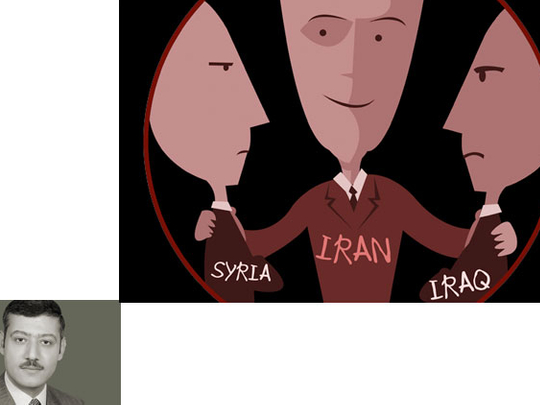
At a time when most of the Syrian regime’s former friends and allies are abandoning it for the brutal approach it has been using to quash the protest movement; Iraq, which can by no means considered a friend, is becoming — alongside Iran off course — the major backer of the embattled Syrian government. Today, Iraq constitutes the biggest market of Syria’s manufactured commodities and is thus offering a shield against Arab and European sanctions.
Politically, Baghdad is providing a safety net for the increasingly isolated Syrian regime, particularly in the Arab world. From a logistical viewpoint, following the US withdrawal at the end of last year, Iraq compensated for the loss of Turkey as the major land route that connects the Syrian regime to its solid base of support in Iran. Given the historic animosity between Damascus and Baghdad, the behaviour of the Iraqi government must be perplexing. Yet, coming to the rescue of a longtime regional foe is something not quite unfamiliar in political behaviour, though it must have very strong motives to occur.
Since they emerged as modern states following the collapse of the Ottoman Empire at the beginning of the 20th century, Syria and Iraq could hardly develop any meaningful friendly relations. On the contrary, their relations have been fraught with fear and suspicion especially after they won their independence from colonial European powers. Relations deteriorated when the two wings of the Baath party took over power in Damascus and Baghdad in 1960s.
In the following three decades, Syrian-Iraqi relations were shaped by mistrust and antagonism, and marked by numerous mutual attempts to unseat each other’s governments. Syria also supported Iran in its eight-year war against Iraq, whereas Iraq backed anti-Syrian Lebanese factions during the civil war.
Nevertheless, the two regimes shared a common feature: utmost pragmatism. Thus, since 1997, Syria and Iraq had come to view one another as possible allies. In response to the ascendance of the Israeli right to power and the ensuing failure of the peace process, the late Syrian president Hafez Al Assad started cautiously, but steadily, to develop relations with Iraq. Rapprochement accelerated following the arrival of President Bashar Al Assad, as he lacked the personal animosity which marked the relationship between Saddam Hussain and his father.
Subsequently, Syria tried to develop its political and economic ties with Iraq while being careful not to provoke the Bush administration. After the September 11, 2001 attacks on the US, Damascus supplied Washington with ‘valuable’ information about Islamic activists. In return, Washington turned a blind eye to the smuggling of Iraqi oil through Syria. This tacit understanding did not last long, as the Taliban regime crumbled quickly and Iraq became the focus of US policy in the region.
In a region still strongly dominated by a realpolitik approach and a delicate balance of power, Syria feared that a US-backed government in Baghdad would almost certainly place it between two hostile powers: Israel and a pro-US Iraq. Syria thus viewed the war as an attempt to reshape the regional political map to its disadvantage, and was particularly concerned with the impact of Iraq’s possible disintegration on its own Kurdish minority.
For most of the eight years long US occupation, Iraqi officials persistently accused Syria of trying to undermine the stability of post-Saddam Iraq. In fact, since day one of the US invasion, Syria struggled to accommodate itself to the strategic shift which made the US a Middle Eastern power. Syria’s position was not based on pan-Arabism, sympathy with a sisterly Arab country or affiliation to Baathist ideology, but rather on pragmatic provisions directly linked to its security dilemma and economic interests.
After a 24-year break, the resumption of diplomatic relations between Damascus and Baghdad in 2006 did not much improve bilateral relations. They only strengthened in March 2010, when Syria, under Iranian pressure, supported Iraqi Prime Minister Nouri Al Maliki to a second term, and several trade deals increased Syrian investment in Iraq.
Thus when the protest movement broke out in Syria a year later, Al Maliki, also under Iranian pressure, supported the Syrian regime, illustrating how much Iraq’s position in the Middle East has shifted toward an axis led by Iran.
Over the past few months, Baghdad hosted several delegations of Syrian government officials and businessmen to discuss closer economic ties, including the construction of a gas pipeline that would run from Iran through Iraq to Syria.
The improved relations between the two Arab neighbours constitute today the cornerstone of a new regional alignment which began to take shape following the break out of the Syrian uprising and the withdrawal of the US forces from Iraq.
The other camp of this new Middle East alignment is led by Turkey and includes the Arab Gulf states and Jordan. The future of the region will be defined by the outcome of this conflict.
Dr Marwan Kabalan is the Dean of the Faculty of International Relations and Diplomacy at the University of Kalamoon, Syria.









